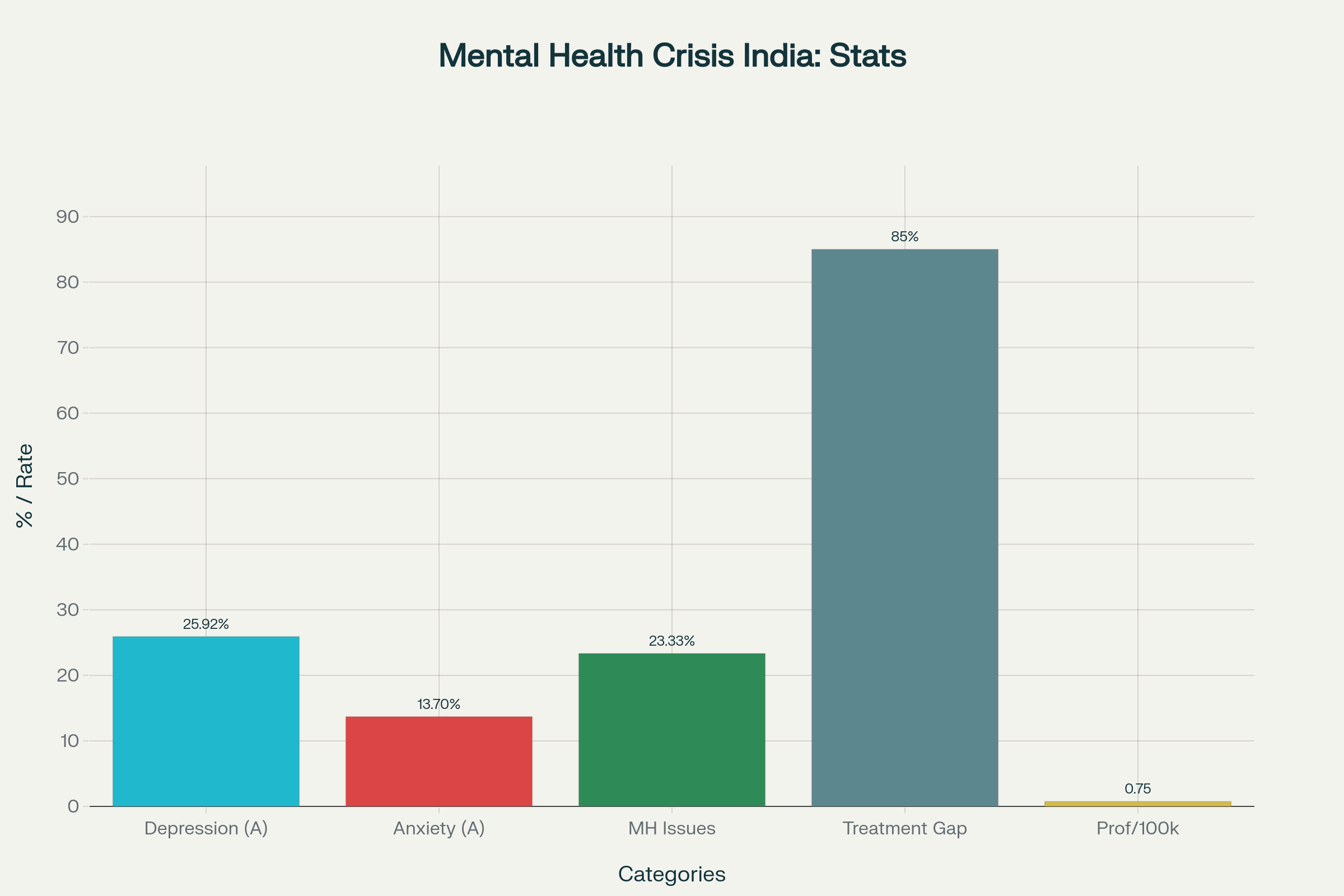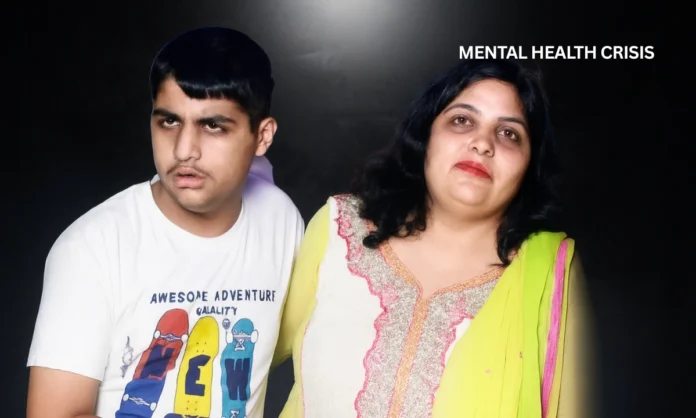Key Highlights:
- 37-year-old Sakshi Chawla jumped from 13th floor with her 11-year-old mentally ill son Daksh in Greater Noida’s Ace City
- India records over 10,730 child and adolescent suicides annually, with mental health issues being a leading cause
- The tragedy highlights critical gaps in community mental health support, particularly for families caring for children with prolonged mental illness
Opening Overview
The devastating Greater Noida mental health crisis took a tragic turn when Sakshi Chawla, a 37-year-old mother, jumped to her death along with her 11-year-old son Daksh from their 13th-floor apartment in Ace City on September 14, 2025. This heartbreaking incident has brought renewed attention to India’s growing mental health emergency, particularly regarding inadequate support systems for families dealing with prolonged mental illness in children.
The Greater Noida mental health crisis reflects broader systemic failures, as official data reveals that mental health disorders affect 10.6% of Indian adults, with treatment gaps ranging between 70% and 92% for different conditions. Sakshi’s suicide note, which read “We are leaving this world… Sorry. We do not want to trouble you anymore,” underscores the immense psychological burden experienced by caregivers of mentally ill children in a system with limited community support.
Community Mental Health Infrastructure Failures
The Greater Noida mental health crisis exposes critical deficiencies in India’s community-based mental health support systems, particularly for families managing children with chronic psychological conditions.
- National Mental Health Programme operates in only 767 districts nationwide, leaving significant coverage gaps in urban areas like Greater Noida
- The treatment gap for mental disorders ranges between 70-92%, with urban metro regions showing higher prevalence (13.5%) compared to rural areas (6.9%)

Mental health statistics in India showing high prevalence of depression and anxiety among youth, significant treatment gaps, and shortage of mental health professionals
According to the National Mental Health Survey 2015-16, while 10.6% of Indian adults suffer from mental disorders, the availability of qualified professionals remains critically low. The Greater Noida mental health crisis is compounded by the fact that India has only 0.75 psychiatrists per 100,000 population, compared to 6 psychiatrists per 100,000 in high-income countries. This shortage particularly affects families like the Chawlas, where prolonged caregiving stress for a mentally ill child creates secondary mental health challenges for parents and siblings.
District Mental Health Programs, while established in Greater Noida’s parent district, often lack adequate resources to provide comprehensive family support services, focusing primarily on individual treatment rather than holistic family care approaches. The Greater Noida mental health crisis reflects systemic gaps in early intervention programs that could have provided Sakshi with counseling, respite care, and stress management resources during her decade-long caregiving journey.
Rising Child Mental Health Emergency
The Greater Noida mental health crisis mirrors a national emergency in child and adolescent psychological well-being, with India recording the world’s highest number of youth suicides at 10,730 cases annually.
- Depression affects 25.92% of school-going adolescents, while anxiety impacts 13.70% of this vulnerable population
- Mental health issues among Indian children show a prevalence rate of 23.33% in school settings, with significant underdiagnosis and treatment gaps
Research published in peer-reviewed journals indicates that Indian children and adolescents face a complex array of mental health challenges, including depression, behavioral problems, anxiety, and psychological distress. The Greater Noida mental health crisis exemplifies how prolonged mental illness in children creates cascading effects throughout family systems, often leading to caregiver burnout and secondary trauma. National Crime Records Bureau data reveals that 40% of suicide deaths in men and 56% in women occur between ages 15-29, highlighting the critical importance of early intervention during childhood.
The case of 11-year-old Daksh, who had been receiving mental health treatment for over a decade, demonstrates the inadequacy of current pediatric mental health services in providing comprehensive family support. The Greater Noida mental health crisis reflects broader challenges in integrating family therapy, respite care, and community support programs into standard treatment protocols for children with chronic mental health conditions.
Systemic Prevention and Support Gaps
The Greater Noida mental health crisis highlights fundamental weaknesses in India’s suicide prevention infrastructure, despite recent policy initiatives and increased awareness programs.
- The National Suicide Prevention Strategy aims to reduce suicide mortality by 10% by 2030, but implementation remains inconsistent across urban areas
- Tele MANAS helpline has handled over 14.5 lakh calls since launch, indicating massive unmet demand for mental health crisis intervention
Government initiatives like the National Tele Mental Health Programme, operational across 53 centers in 36 states, demonstrate recognition of the mental health crisis but reveal capacity limitations in handling complex cases like chronic pediatric mental illness. The Greater Noida mental health crisis exposes gaps in crisis intervention protocols for families experiencing prolonged caregiver stress, as existing helplines often lack specialized training for supporting parents of mentally ill children.
Economic Survey 2023-24 data shows that 11% of students report feeling anxious, 14% experience extreme emotions, and 43% suffer mood swings, yet community mental health programs remain underdeveloped in urban areas like Greater Noida. The Greater Noida mental health crisis demonstrates urgent need for integrated community mental health approaches that address both individual patient needs and family system support, including respite care, financial assistance, and specialized counseling for caregivers of chronically mentally ill children.
Policy Recommendations and Future Directions
The Greater Noida mental health crisis demands immediate policy interventions to strengthen community-based mental health support systems and prevent similar tragedies through comprehensive family-centered care approaches.
Current government initiatives, while promising, require significant expansion and localization to address urban mental health challenges effectively. The Greater Noida mental health crisis underscores the need for integrated service delivery models that combine clinical treatment with community support, respite care, and caregiver wellness programs. Implementation of the National Mental Health Policy must prioritize development of specialized programs for families managing children with chronic mental illness, including financial support, therapeutic respite services, and peer support networks.
The Greater Noida mental health crisis also highlights the importance of reducing stigma through community awareness programs and establishing neighborhood-level mental health first aid initiatives. Future prevention strategies must focus on early identification of caregiver distress, mandatory family support services in pediatric mental health treatment protocols, and development of crisis intervention systems specifically designed for families experiencing prolonged mental health caregiving stress.
Closing Assessment
The Greater Noida mental health crisis represents more than an isolated tragedy—it exposes systemic failures in India’s approach to supporting families navigating chronic pediatric mental illness. With over 253 million children and adolescents in India, the highest proportion globally, the nation cannot afford to continue treating mental health as an individual rather than community challenge.
The Greater Noida mental health crisis demands urgent action to bridge the gap between policy intentions and ground-level implementation, ensuring that families like the Chawlas receive comprehensive support before reaching crisis points. Only through integrated, community-based approaches that recognize the interconnected nature of mental health within families can India begin to address the broader mental health emergency reflected in this devastating Greater Noida incident.


